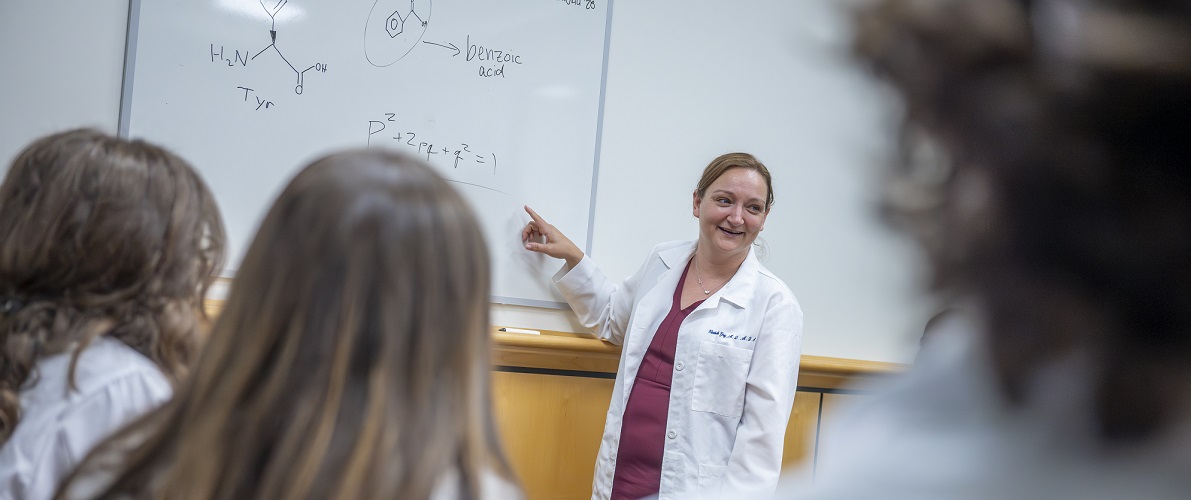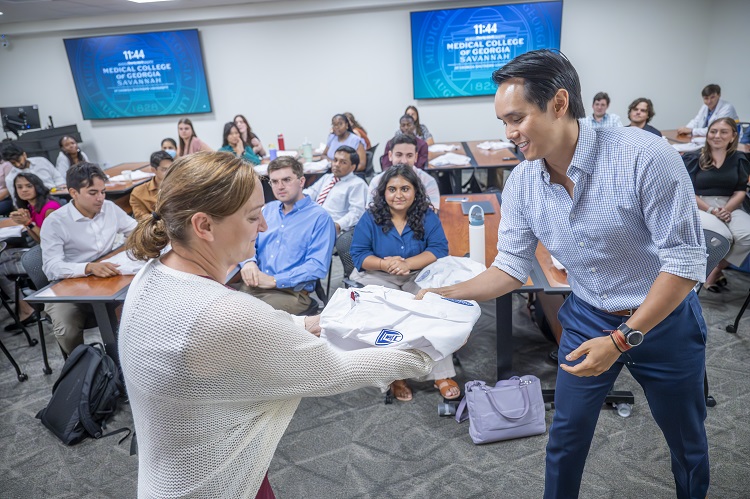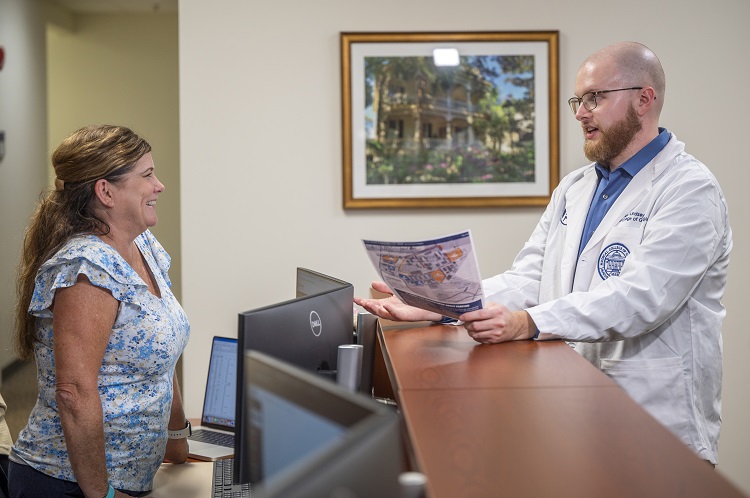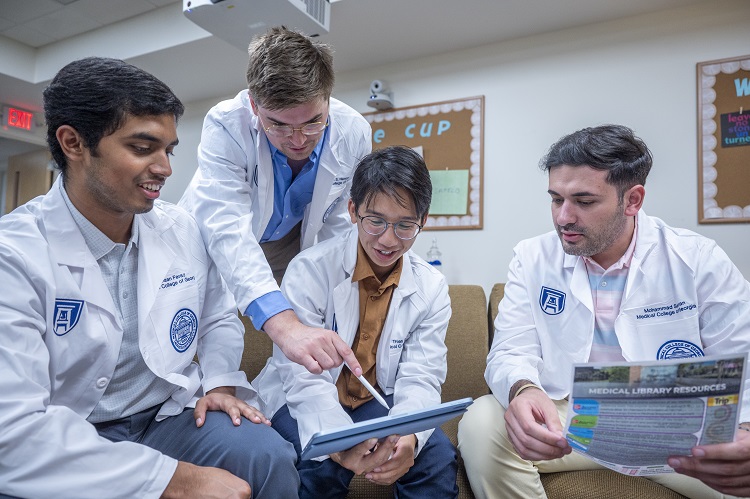
Curriculum
Welcome to the Curriculum Office at MCG Savannah.
Our dedicated team is committed to providing comprehensive support and resources to ensure the success of our students throughout their medical education journey. Our mission is to cultivate future physicians who are not only clinically competent but also intellectually curious, innovative, and compassionate. We are committed to fostering a dynamic learning environment that promotes critical thinking, lifelong learning, and excellence in patient care, research, and advocacy.



MCG 3+ Curriculum
The MCG 3+ Curriculum is a three-year core curriculum which provides the foundational knowledge and skills needed to succeed in medicine. The core curriculum consists of a Preclerkship Experience, a Clerkship Experience, and an Enrichment Experience.
Preclerkship Experience:
During the eighteen-month Pre-clerkship Curriculum students acquire foundational science knowledge along with skills required for clinical decision-making and patient care. The integrated, clinical case-based pre-clerkship curriculum consists of thirteen modules and courses that include large and small group learning, laboratories (anatomy, simulation, ultrasound), and clinical skills sessions that utilize both standardized patient and real patient encounters. Weekly clinical cases are the cornerstone of the curriculum which are used to facilitate learning of foundational basic science content, clinical care, public health and advocacy, professionalism, ethics, cultural competency, evidence-based medicine, and value-based healthcare. At the conclusion of this Pre-clerkship Curriculum, students will be equipped with the necessary knowledge, skills, behaviors, and attitudes to successfully perform in the Clerkship phase of the curriculum. Grading is pass/fail in the Pre-Clerkship Curriculum and passing the USMLE Step-1 is a requirement for promotion to or successful completion of the Clerkship Curriculum. Teaching strategies include interactive small group learning, which includes Case-based learning (CBL), and Patient-Centered Learning (PCL), preceptor relationships (You+ Learning), and Large Group lectures that are linked to course objectives (described below).
Case-Based Learning
Case-based Learning (CBL) provides an opportunity for Pre-clerkship students to work in small groups to discuss real patient cases under the direction of clinical and foundational science educators and learn how to develop broad differential diagnoses, discuss pertinent positive and negative signs and symptoms, and develop a management plan.
Patient-Centered Learning
Patient-Centered Learning (PCL) is a hands-on, clinical skills longitudinal course that develops students’ skills including history taking, performing a physical exam, and working as a team to manage patients. Hands-on activities include high-fidelity simulations, standardized patient encounters, and workshops, with each week being integrated with CBL module content.
You+ Learning course
You + learning course is a Pre-clerkship course that is designed to help prepare students for their role as a physician maximizing learning related to professional identity formation. The core pillars of this course are: 1. Ethics, 2. Leadership, and 3. Health, equity, and justice.
Large Group Sessions
Large group sessions include lectures, team-based learning (TBL), labs, and panels to provide foundational knowledge in preparation for the clerkships.
Clerkship Experience:
The Clerkship phase of the curriculum consists of electives, and Core clinical clerkships in: Neurology (3 weeks), Psychiatry (3 weeks), Ob/Gyn (6 weeks), Surgery (6 weeks), Medicine (6 weeks), Pediatrics (6 weeks), Family Medicine (6 weeks). These rotations will be done across the state of Georgia allowing you to get the flavor of healthcare in our state. As part of these clerkships (except in Neurology and Psychiatry), you will have one afternoon in Clerkship PCL where you will run a patient simulation in the specialty you are rotating in. These encounters will provide formative feedback on the skills/ EPAs (Entrustable Professional Activities) that determine your readiness for residency.
Enrichment Experience
This phase of the curriculum will help you grow and develop into the physician that you want to be. It will provide you with opportunities to rotate in specialty areas of your career interest. In addition to completing some additional electives, you will need to complete Emergency Medicine (4 weeks) clerkship, Ambulatory medicine selective (4 weeks), Critical care selective (4 weeks), and a Sub-Internship rotation (4 weeks). The (+) portion of the 3(+) curriculum can consist of:
- Advanced Residency Preparation (Residency Jump start) pathway offers the option to complete the core curriculum in three years, then utilize the
fourth year to participate in career oriented advanced clinical training and research,
through a focus on the skills and competencies essential to their desired residency
program. This pathway also offers the opportunity to engage in away elective options.
- Dual Degree Pathway offers the option to complete the core curriculum in three years, then obtain a dual
degree either in business (MBA) or public health (MPH) at Augusta University in their
fourth year of study to prepare students for careers in academic medicine. Students
interested in this pathway will undergo an application and selection process. Currently
the MPH program is online, and the MBA program is in person on the Augusta campus.
- Advanced Research Pathway offers the option of rigorous research with faculty mentor support and guidance. Students
will be required to complete a scholarly project in addition to the research project,
and must also complete the advanced clerkship phase, and six weeks of electives. Students
will be required to present a poster at Research Day in the graduating year and give
a final presentation to their mentor, research team, and curriculum faculty.
- PGY1-Pathway (3+ primary care residency pathway) offers the option for students to enter primary care residencies and become primary care doctors for rural and underserved areas in Georgia at an accelerated pace. The 3+ Primary Care Pathway students graduate in three years and immediately enter a residency in either family medicine, internal medicine, pediatrics, psychiatry, emergency medicine, obstetrics and gynecology or general surgery.
Research Support Services
In addition to our core curriculum, we offer a range of research support services to help students engage in scholarly inquiry and pursue their academic interests. Our research support services include access to library resources, research workshops and seminars, mentorship opportunities, and funding assistance for research projects. Whether you're interested in basic science research, clinical research, or translational research, our team is here to help you develop the skills and experience necessary to contribute to the advancement of medical knowledge.
Professional Development Opportunities
We believe that professional development is an essential component of medical education, and we offer a variety of opportunities for students to enhance their skills and prepare for their future careers. From workshops and seminars on communication skills to professionalism, we provide students with the resources and support they need to succeed in their chosen fields.
Continuous Improvement and Evaluation
At MCG Savannah we are committed to continuous improvement and evaluation of our curriculum and programs. Through ongoing assessment and feedback from students, faculty, and stakeholders, we identify areas for improvement and opportunities for innovation. By leveraging data-driven insights and best practices in medical education, we strive to continuously enhance the quality, relevance, and effectiveness of our curriculum to better serve the needs of our students and prepare them for successful careers in medicine.